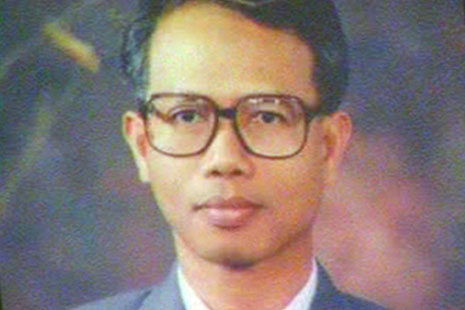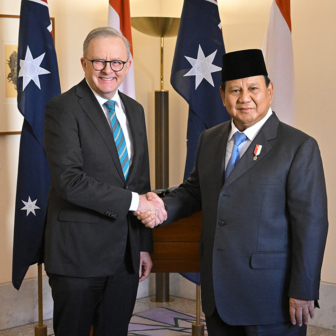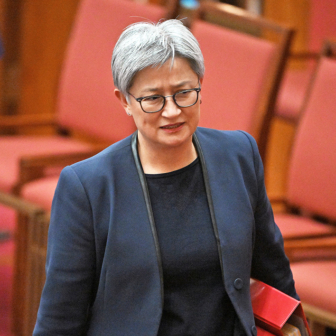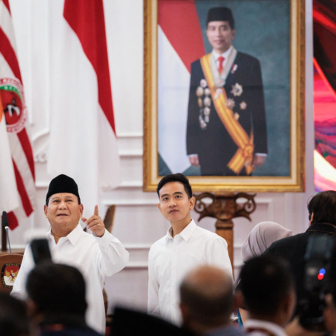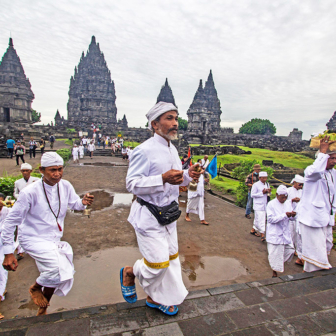ANGKHANA NEELAPAIJIT doesn’t look like the type of person who’d put up a fight. When I meet her, on a typically sweltering Bangkok day, I am surprised by the figure I encounter. The stories about her suggest a warrior-like woman – tough, uncompromising and battle-ready. Yet everything about Angkhana, on our first meeting, seems soft, gentle and measured. From the way she gingerly places her hand in mine when I initiate an introductory handshake to the way she carefully folds, then refolds her napkin to soak up the condensation dripping from her iced coffee onto the table between us.
Yet for the last decade this small, unassuming woman has fought tirelessly to uncover the truth about what happened to her husband, Somchai Neelapaijit. He was a prominent Bangkok-based human rights activist and lawyer, and he went missing on 12 March 2004. Angkhana believes that this was no ordinary disappearance, but a forced abduction, carried out by police and government officials. Despite Angkhana’s efforts, no one has been held accountable for Somchai’s disappearance, and there are recent reports that Thailand’s Department of Special Investigations, or DSI, plans to shut down its investigation.
When I ask if she is comfortable answering questions about Somchai, and her life and work since his disappearance, she nods thoughtfully and quietly replies, “Yes, of course.” It occurs to me that dredging up nightmarish events of the past is routine for her: a horrible yet necessary ordeal. Her quiet composure isn’t a sign of weakness: here before me is a woman who has been fighting for a very long time, a woman who believes her fight is very likely to continue until she dies.
THE STORY of Somchai’s disappearance is not unlike a Hollywood thriller: the abduction of an innocent civilian who knew too much about corruption and police injustices against Muslim defendants. What’s lacking, however, is the happy ending, or any kind of satisfactory resolution.
Unlike many of his peers at law school, Somchai wasn’t driven by the pursuit of money. Instead, he became a defender of the rights of Thailand’s forgotten men. Many Muslim men have been detained under martial law and emergency decree, and charged with crimes relating to terrorism and some drug-related offences, which are punishable by death under the country’s Criminal Code. In many cases that Somchai defended, the accused claimed they were tortured and that their admissions of guilt were beaten from them.
Although he defended people across the country, he was increasingly drawn to pro bono legal work in the turbulent, predominantly Muslim and insurgency-plagued southern border provinces of Thailand. There has long been unrest in the area – partly as a result of forced assimilation policies, repressive government forces and, more recently, police brutality and perceived injustices enabled by three pieces of emergency legislation.
As a Muslim, Somchai felt it was his duty to defend these “brothers.” He wasn’t prepared to turn a blind eye to the injustices and human rights violations carried out by the government in the name of public safety. In legal circles, he came to be known as the “Muslim Bandits’ Lawyer.” In his last public speech – a fiery one delivered only two weeks before his disappearance – he made various accusations against many powerful members of Thai society. He also documented instances of torture and government misconduct. The following excerpt, from a translation Angkhana gave me, reveals his frustration:
The police had urinated in his [Somchai’s client’s] mouth, he was told to lie down and then they urinated on him and they rubbed their feet on his face. He cried over and over again while I spoke to him. If he was really a bandit as the police say, would he give up so easily?
The day before his disappearance, Somchai sent a letter to high-level state officers about the torture of his clients. He had also organised a petition calling for revocation of martial law in the southern provinces and was planning to personally deliver it to Thailand’s prime minister at the time, Thaksin Shinawatra, during a scheduled visit to the south. He never got the chance.
WHILE the details of Somchai’s disappearance are a bit murky, eyewitnesses have testified that four or five police officers forced him into a car at around 8.30 pm. Five officers were charged with coercion and robbery in relation to the disappearance. There are telephone records showing constant communication between the officer’s phones on the night of Somchai’s disappearance. These records also show a call was made from one of the officer’s phones to the prime minister’s office that night.
One of the officers was found guilty, in the Court of First Instance, of coercing Somchai into a car. The officer appealed this conviction, was released on bail and then – in true Hollywood fashion – went missing in a landslide in 2008, though some speculate he fled Thailand with state assistance. The other four officers were found not guilty of coercion and robbery. The Court of Appeals affirmed their innocence in 2011, and also ruled that the now-missing police officer was not guilty and that Angkhana and her family, who had been complainants in the case, lacked standing to be parties to the proceedings.
“I think he was very scared,” says Angkhana Neelapaijit.
Although the International Commission of Jurists, or ICJ, observed the trial and judged the proceedings to be fair, it nevertheless raised serious concerns about the “overall legal process,” in particular the impartiality of officers investigating Somchai’s disappearance. What is more, former prime minister Thaksin Shinawatra has publicly admitted that Somchai is dead and has acknowledged the involvement of government officials. Reports that the DSI will, nevertheless, end its investigation prompted immediate concern from the ICJ, which issued an open letter to the prime minister and the minister of justice. However, Somchai’s body has not been recovered, which remains one of the biggest impediments to justice. No one has yet been tried for his murder, and such a trial is unlikely to occur unless a body – or forensic evidence – is produced.
However, many observers believe that a government response of some kind is necessary. Local and NGOs have been applying pressure and, according to Thailand’s National Reconciliation Commission, the disappearance has had “a direct impact on state-citizen relations.” The Commission goes on to say:
Many people, in particular the country’s minority, felt that here was someone who always put his faith in the state’s justice process, yet even he was not safe. It goes without saying how important faith in every country’s justice process is to state–citizen relations.
The latest twist in this whole drama is that, earlier this year, the government claimed that important investigation documents were irretrievably lost during anti-government protests in Bangkok. Many believe this is another cover-up attempt in the ongoing saga.
ANGKHANA married Somchai in 1981, and together they have five children. They lived a relatively simple life, devoid of luxuries: their combined income was just enough to subsist on and provide their children with a good education. (At the time of his disappearance Somchai had only 300 Thai baht in his bank account, the rough equivalent of A$11.)
“He sacrificed a lot for the poor,” recalls Angkhana, who believes Somchai’s approach to his work was the product of his humble upbringing in a poor rural family of rice growers. But while his work was charitable, it was also inherently risky. Angkhana is aware of threats he received, but says he kept these secret at the time because he didn’t want to worry or scare his family. When I ask whether she thinks Somchai was fearful, Angkhana does not pause to consider her answer: “I think he was very scared.”
For Angkhana, the days, weeks and months following Somchai’s disappearance were filled with feelings of hopelessness, fear and frustration. Many of Somchai’s friends went into hiding in neighbouring countries, and those who remained were unwilling to help – some even advised her to stop agitating the law enforcement agencies. “Nobody wanted to talk about Somchai, nobody wanted to go with me to the police station.”
She recalls a conversation with a politically connected friend of Somchai, who suggested an open and thorough investigation was a lost cause, “He said he believed Somchai was murdered and will not come back again. I told him, you’re a minister and Somchai is your friend – can you do anything more? And he told me that Somchai was already dead and I couldn’t do anything.” She believes his reluctance to help was likely caused by a justified fear of speaking out against the Thaksin government.
The case against the five police officers was heard in 2005. While Angkhana had lawyers representing her and her family’s interests during the trial, these lawyers were not easily retained and seemed uninterested – some even fell asleep during proceedings, she says. Angkhana tried to make sense of the legal process which, as she is a nurse not a lawyer, was completely foreign to her. It was made even more burdensome by her own emotional involvement and the intimidation tactics employed by police.
“I had to be very patient,” she recalls. “Sitting every day in the court, and writing every word of the witness testimony in my diary, and sitting face to face with the accused police… In the courtroom there were a lot of police, sitting laughing, whatever.” She has one memory that stands out above the rest: an eyewitness, in tears inside the courtroom, scared to look up and identify the police officers she saw push Somchai into the car.
Over time Angkhana has become more accustomed to dealing with Thailand’s official bodies. She was, after all, responsible for lodging the first police report, and filing a complaint with the Administrative Court against the Royal Thai Police. Despite receiving numerous threats warning her to desist throughout the legal proceedings, she also lodged appeals against the decisions of the Court of First Instance and the Court of Appeal. And on top of that, she has founded a non-government organisation called the Justice for Peace Foundation, which has continued working for the rights of Muslims in the south, and she has played a critical role in making submissions to the UN Working Group on Enforced or Involuntary Disappearances.
Now, Angkhana is again hard at work, this time planning an event to commemorate the ten-year anniversary of her husband’s disappearance. Hosted by the Thailand branch of the ICJ, the event will, she hopes, apply additional pressure on the Thai government to give her some answers, and finally, some closure and a sense of justice being served.
MOST of Angkhana’s children have now grown up. All will be university educated, and one has even become a judge – a career choice strongly influenced by her father.
When speaking about the effect on her family Angkhana struggles to convey the emotions that for many of us are simply unimaginable. She talks about distressing and slanderous newspaper articles about Somchai, and the largely uninterested and ignorant social attitudes and perceptions regarding Somchai’s legal work and activism.
“It’s like, nobody knew Somchai,” she reflects. “The high citizens know him only as someone who defended people who were accused of insurgency. So I told my children it is our job to educate people about Somchai, and who he was; about his thinking, about his way of life, about his beliefs.”
This desire has given her family strength and purpose, she says. Though angered by suggestions that the DSI investigation might close, Angkhana continues to pressure the government, working alongside the ICJ, Thailand’s Union for Civil Liberties, and the International Federation for Human Rights.
And through the Justice for Peace Foundation she is helping victims of enforced disappearances (that is, the family members who remain) in the southern provinces seek legal recourse. She tells me that this work has seen the introduction of new legislation, and some thirty families from the south have received compensation for the enforced disappearances of loved ones.
Angkhana too has received compensation from the Thai government for her husband’s disappearance, but she is too frightened to touch the money, and is keeping it safe in case the police sue her at a later date. In any event, Angkhana is ultimately seeking a different sort of redress.
“I think it’s not fair,” she says. “I can return the money. Give me justice.” And despite the continual hurdles she has faced in her search for truth, Angkhana remains hopeful that one day the justice she seeks will be found. “I don’t know that the rest of my life I can find justice… but maybe one day, in twenty years, thirty years, the truth will come out.”
